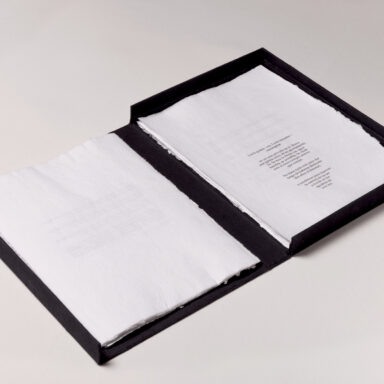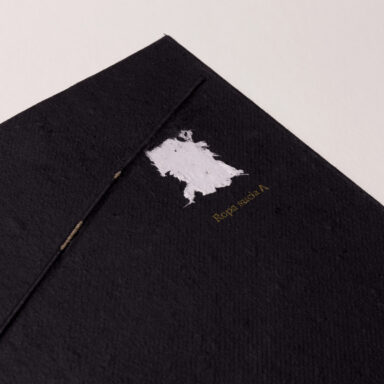Basic Information
Title: Ropa sucia (The Wash)
Artist(s):
Ana Maria Caballero
Date Created: 2025
Edition Info: 2/5
Unframed Dimensions: 12.25 x 9 x 1.5 in.
Medium: artist's book with poems and 1/1 algorithmically generated PNG
Inventory ID: Caballero-2025-01
Description
Ropa sucia (The Wash) is a limited edition artist book by Ana María Caballero, released in partnership with S/W Ediciones. Each version of Ropa sucia contains a unique set of twelve poems and materials with which to hang them. All the poems are from Caballero’s newest manuscript, /Cortadas.
Collectors may arrange the poems as they wish, representing generative readership: Caballero’s idea that every reading is its own universe. In assembling the book’s pages, collectors become co-creators. Written in the artist’s signature, straightforward style, these poems convey the rich layers of signification hidden within our everyday exchanges. Caballero’s texts give voice to what’s left unsaid in the all-important space of home, hanging dirty laundry—literally—out to dry.
The paper on which the poems are printed was handmade out of the artist’s old sheets – the result of a close collaboration with ARRATOS, an artisanal paper-making studio in Madrid.
Each artist book also includes a digital file that presents a singular “reading” of its texts, as conveyed by a tailor-made algorithm.
Caballero worked with Cameron Nelson on Ropa sucia’s algorithm. Nelson used the artist’s previous performative interventions as source material in designing the generative mark-makings. The digital file, designed to convey an unbound book, incorporates stills from a choreographic performance by Caballero, in which the artist expresses one of Ropa sucia’s poems via movement, probing the connection between embodied experience and the language that attempts to record it.
The composition relies on an array of digital drawing tools including Python, shader code, HTML, and Javascript via the p5.js framework, and draws on a visual language developed in Ana María Caballero’s prior works including Waiting Room, where poetry was transformed through interpretive dance, chalk, and acrylic into a series of handmade marks.
Scattered stamps of the poet’s body in motion – still frames from the recorded choreography, extracted with AI – contextualize this mark-making as they dance between the words on the page. The resulting etchings speak an evocative, guttural language, a poetic mark-making that transmits the immediacy and urgency of performance.
Individual fragments, corresponding to a few seconds each and transcribing specific gestures, are handpicked and drawn using shaders specially built to emulate physical media. The PNGs provided are in high-resolution format and may be printed by the collector at up to 130cm x 90cm.
The pages of Ropa sucia are culled from /Cortadas, a novel-in-verse written by Caballero as an homage to Julio Cortázar’s iconic Rayuela, considered by many to be the first hypertext novel. Caballero’s manuscript contains 155 one-page chapters, in honor of Rayuela’s 155 chapters.
As with Rayuela, /Cortadas can be read in infinite ways, leaning into Caballero’s idea of analog generativity, the notion that every reading is its own unreapeatable universe.
/Cortadas belongs on a shelf beside genre-defying works by authors who’ve fused narrative and poetic forms, such as Esther Tusquets, Maggie Nelson, Clarice Lispector, Annie Ernaux, and Anne Carson. In /Cortadas, writing and reading become acts of resistance, challenging societal norms and conventional literary craft. Through an implicit collaboration, writer and reader become inseparable, united on a mission that hinges on the agency of language and whose aim is saving Lucía’s life.
Narrative perspective twists to question post-colonial identity and to deeply penetrate within Lucía’s private narrative, confounding the voice of the protagonist with that of the author, merging creation with creator. This agile, lyric novel offers a bold vision of the power of storytelling, infusing it with the power to heal and transform. Its pages also gift such power to the reader, inviting them to read as they love and to love as they read.







